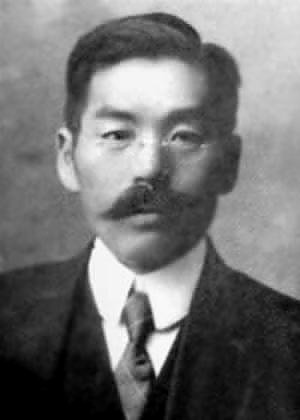In 1997, on the eve of the release of James Cameroon’s blockbuster movie Titanic, a curious story from Japan came to light. It was about Masabumi Hosono, a Japanese civil servant, who found himself on the ill-fated ship on the night of 15 April 1912 during its maiden journey from Southampton to New York City. Hosono survived the disaster, but going back home had to face the scorn of his native people. According to them, Hosono should have gone down with the ship as any proud Samurai would have when faced with adversity.
In 1910, Hosono was working as the railroad director for the Ministry of Transport. Because of his proficiency in the Russian language, Hosono was sent to Russia to study the Russian state railway system. After staying two years in Russia, Hosono went to London and then to Southampton where he boarded Titanic on 10 April 1912 as a second class passenger.

Sinking of the Titanic by Willy Stöwer (1864–1931).
On the night of 15 April, the ship stuck an iceberg and breached its hull. Water started to pour in. Passengers panicked. It was certain the ship was going down. Hosono was awakened by a steward. He quickly made his was to the boat deck, and what he saw there sank his heart. “All the while flares signalling emergency were being shot into the air ceaselessly, and hideous blue flashes and noises were simply terrifying. Somehow I could in no way dispel the feeling of utter dread and desolation,” Hosono wrote.
At first Hosono contemplated giving up his life. “I tried to prepare myself for the last moment with no agitation, making up my mind not to leave anything disgraceful as a Japanese.” But the thought of not seeing his beloved wife and children again tugged at his heart’s strings. Eventually, he found himself “looking for and waiting for any possible chance for survival.”
His chance came when an officer loading lifeboats shouted “Room for two more,” and a man jumped in. Sensing an opportunity, Hosono jumped after.
“After the ship sank there came back again frightful shrills and cries of those drowning in the water. Our lifeboat too was filled with sobbing, weeping children and women worried about the safety of their husbands and fathers. And I, too, was as much depressed and miserable as they were, not knowing what would become of myself in the long run.”

Masabumi Hosono
The next morning, Hosono’s lifeboat and the passengers it was carrying were rescued by another ship. Hosono had in his coat pocket a sheaf of stationery with Titanic's letterhead on which he started writing a letter to his wife in English. During the ship’s voyage to New York, he used the same paper to write an account in Japanese of his experiences.
At first, Hosono’s story drew little attention. Hundreds had survived the sinking of the Titanic, and each one had, no doubt, a harrowing tale to tell. One New York newspaper, however, ran his story as the “Lucky Japanese Boy”. But back in Tokyo, Hosono found his native people hostile towards him.
Sacrifice, courage and selflessness run deep in Japanese culture. The country’s history is filled with stories of samurai sacrificing themselves through seppuku rather than fall into the hands of enemies. During World War two, hundreds of pilots rammed their airplanes against Allied targets in kamikaze attacks. The Japanese society did not expect Hosono to behave in anything less than an exemplary manner.
Hosono was condemned as a coward by the Japanese press, and in a knee-jerk reaction, the government fired him from his job, only to re-hire him on a contractual basis. Hosono weathered the attacks from his fellow Japanese and attempted to lead a life of low key. He died peacefully in his sleep in 1939 at the age of 68.
Hosono's story remained a source of shame for his family for decades. It wasn’t until James Cameron’s film was released in 1997 that Hosono’s story received a wider audience. Masabumi's grandson’s Haruomi Hosono, who is the leading member of the band Yellow Magic Orchestra, declared that he was "extremely relieved” that the true story became better known. “Honour has been restored to the Hosonos,” he said.
References:
# Masabumi Hosono, Encyclopedia Titanica
# The Last of the Last, Encyclopedia Titanica












Comments
Post a Comment